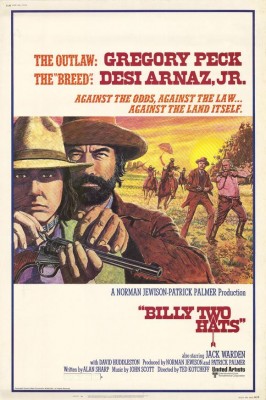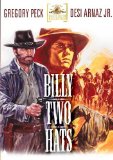| Reviews & Columns |
|
Reviews DVD TV on DVD Blu-ray 4K UHD International DVDs In Theaters Reviews by Studio Video Games Features Collector Series DVDs Easter Egg Database Interviews DVD Talk Radio Feature Articles Columns Anime Talk DVD Savant Horror DVDs The M.O.D. Squad Art House HD Talk Silent DVD
|
DVD Talk Forum |
|
|
| Resources |
|
DVD Price Search Customer Service #'s RCE Info Links |
|
Columns
|
|
|
Billy Two Hats
Unfortunately, the film was not a success but instead ridiculed for, of all silly things, the fact that it had been shot in Israel. Comedians dubbed it "Shalom on the Range" but if you didn't know this going in nothing in the movie itself suggests it was shot anywhere other than the American West, and indeed throughout it's more convincingly, authentically "American" than most of the Euro-Westerns typically shot in Spain, Italy, or Yugoslavia, including Sergio Leone's films.
Part of MGM's "Limited Edition Collection" line of DVD-Rs, Billy Two Hats is presented in 1.78:1 format, approximating its original 1.85:1 theatrical screen format. The transfer is 16:9 enhanced, from what appears to be good film elements, with good color and detail but also some of the worst edge-enhancement I've seen in a long while.
After a man is killed during a bank robbery in which a modest $420 was stolen, racist Sheriff Henry Gifford (Jack Warden) tracks the robbers to a small Western town. Gifford guns down one partner but the ringleader, Scotsman Arch Deans (Peck), escapes, though Gifford does manage to capture the third member of the gang, young Billy Two Hats (Desi Arnaz, Jr.), a half-breed.
On the return trip back to town, Gifford and Billy spend the night at a remote saloon where Copeland (David Huddleston, his long blond hair and beard modeled after Buffalo Bill) hopes to cash in on his access to sweet (i.e., fresh) water when the trains come through. To everyone's surprise, Deans comes to his "breed's" rescue, though in a very exciting, unusual scene, he's shot and wounded by Copeland as they flee, the saloon owner using a long-range hunting rifle. Long before movies like Saving Private Ryan, Billy and Deans hear the gunshot in the distance followed by the whiz of the approaching bullet.
Not wanting to abandon Deans, Billy builds an Indian cot and drag Deans behind his horse, with Gifford and Copeland hot on their trail. Along the way they encounter an opportunistic farmer, Spencer (John Pearce), who abuses his fragile, meek mail-order bride Esther (Siân Barbara Allen), a stutterer.
Director Norman Jewison and frequent collaborator Patrick J. Palmer produced the film, which was directed by Ted Kotcheff, whose amazing career began in British television, including the infamous Underground, a live TV play in which one of the stars died of a heart attack halfway through the broadcast. Kotcheff directed one of his best films, The Apprenticeship of Duddy Kravitz the same year as Billy Two Hats, followed by several interesting movies such as the underrated North Dallas Forty (1979). His biggest hit was First Blood (1982) and Kotcheff was nearly typed into similar films (Uncommon Valor, 1983), but then he directed the dopey but popular Weekend at Bernie's (1989). Soon after that he returned to television, this time in America, and for the last 11 years has executive produced (and occasionally directed episodes of) Law & Order: Special Victims Unit.
Writer Alan Sharp, a Scot himself, wrote several interesting early-'70s Westerns, including The Hired Hand (1971) and Ulzana's Raid (1972), as well as the later Rob Roy (1995). In Billy Two Hats, Sharp tells a familiar story in interesting, innovative ways. Deans's rescue of Billy, for instance, surprises with its low-key approach. At dawn, as everyone is waking up, Deans gingerly positions himself on a bench a few feet away from Billy and just out of Gifford's view. There he simply waits for Gifford to step outside to ambush him. Peck's performance here - calm to the point of serenity and with his facial gestures reassuring toward Billy - sells the scene, but it's unexpectedly staged and believable.
Later in the film the characters encounter rogue Apaches looking for whiskey. One especially threatening character, in all his Native American glory, carries a dainty white parasol, apparently a souvenir from an earlier raid. Another wears a tintype of a white family as part of a necklace. These souvenirs recall white racist Gifford early in the film, putting the dead third bandit on display in the middle of the town, propping up his corpse into a standing position to be photographed as a kind of ghoulish trophy. These little historically authentic details add a lot of color.
Arnaz had recently left Here's Lucy to star in Marco (1973), a made-in-Japan family film from Rankin-Bass about Marco Polo, but after both that and Billy Two Hats flopped he pretty much went back to TV. However, Arnaz did star in House of the Long Shadows, another MGM MOD title and, in his last film role to date, did a remarkable job imitating his father in The Mambo Kings (1992). That film should have been a big hit but wasn't.
Arnaz is okay here. He has so little dialogue for the first 15 minutes or so I assumed the character was mute. And for this reason a more expressive actor might have been a better choice. In the end Billy comes off as enigmatic but I'm not sure that was the intention of the filmmakers. His relationship with Esther has potential and Allen is excellent in her sensitive role, but Arnaz just isn't in Peck's league at all. Then again, few are.
Video & Audio
Part of MGM's movie on demand program - billed under the "Limited Edition Collection" banner - Billy Two Hats is 16:9 enhanced widescreen but that's where the good news ends. Edge-enhancement usually doesn't bother this reviewer but this was distractingly awful. At 4:31, for instance what appears to be two pieces of fine wire run down the side of each building post. At first I thought I was seeing things, until I realized it was edge-enhancement run amuck, especially distracting in long shots or alongside anything with a sharply defined edge. The mono audio is adequate. There are no alternate audio or subtitle options. As usual, this comes with no-frills menu screens (having only a "Play Movie" option) and chapter stops every 10 minutes.
Extra Features
The lone extra is a give-away-the-store trailer, in 16:9 enhanced widescreen.
Parting Thoughts
Except for the extreme edge-enhancement, Billy Two Hats is a pleasant surprise, an unjustly maligned Western with much to Recommend it, especially to genre fans.
Stuart Galbraith IV's latest audio commentary, for AnimEigo's Musashi Miyamoto DVD boxed set, is on sale now.
|
| Popular Reviews |
| Sponsored Links |
|
|
| Sponsored Links |
|
|
| Release List | Reviews | Shop | Newsletter | Forum | DVD Giveaways | Blu-Ray | Advertise |
|
Copyright 2024 DVDTalk.com All Rights Reserved. Legal Info, Privacy Policy, Terms of Use,
Manage Preferences,
Your Privacy Choices | |||||||
















